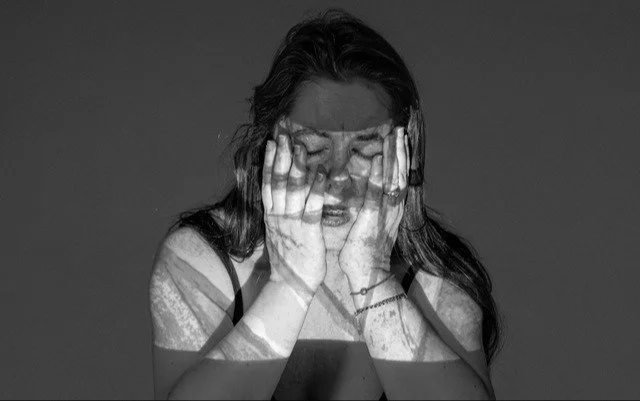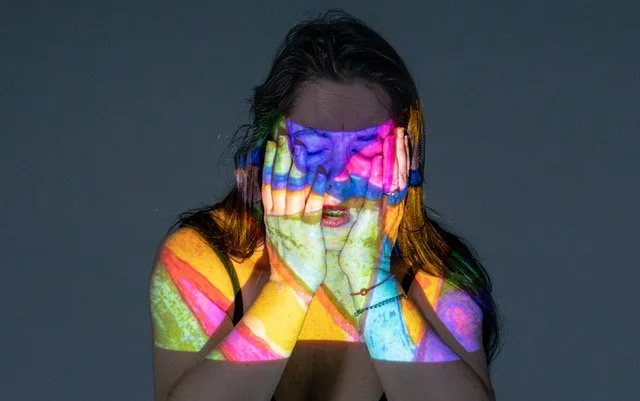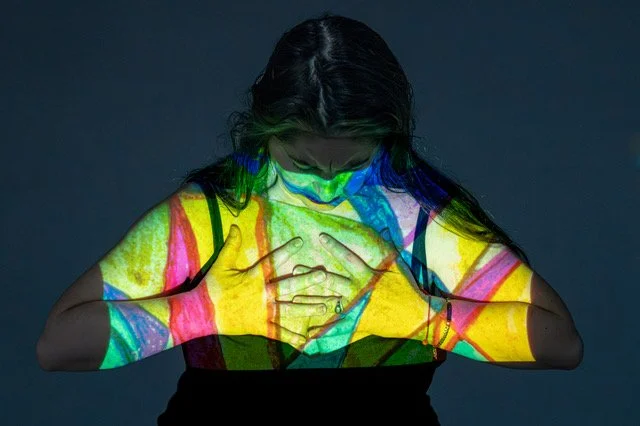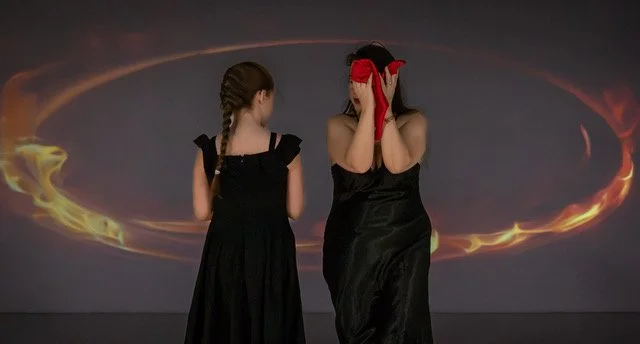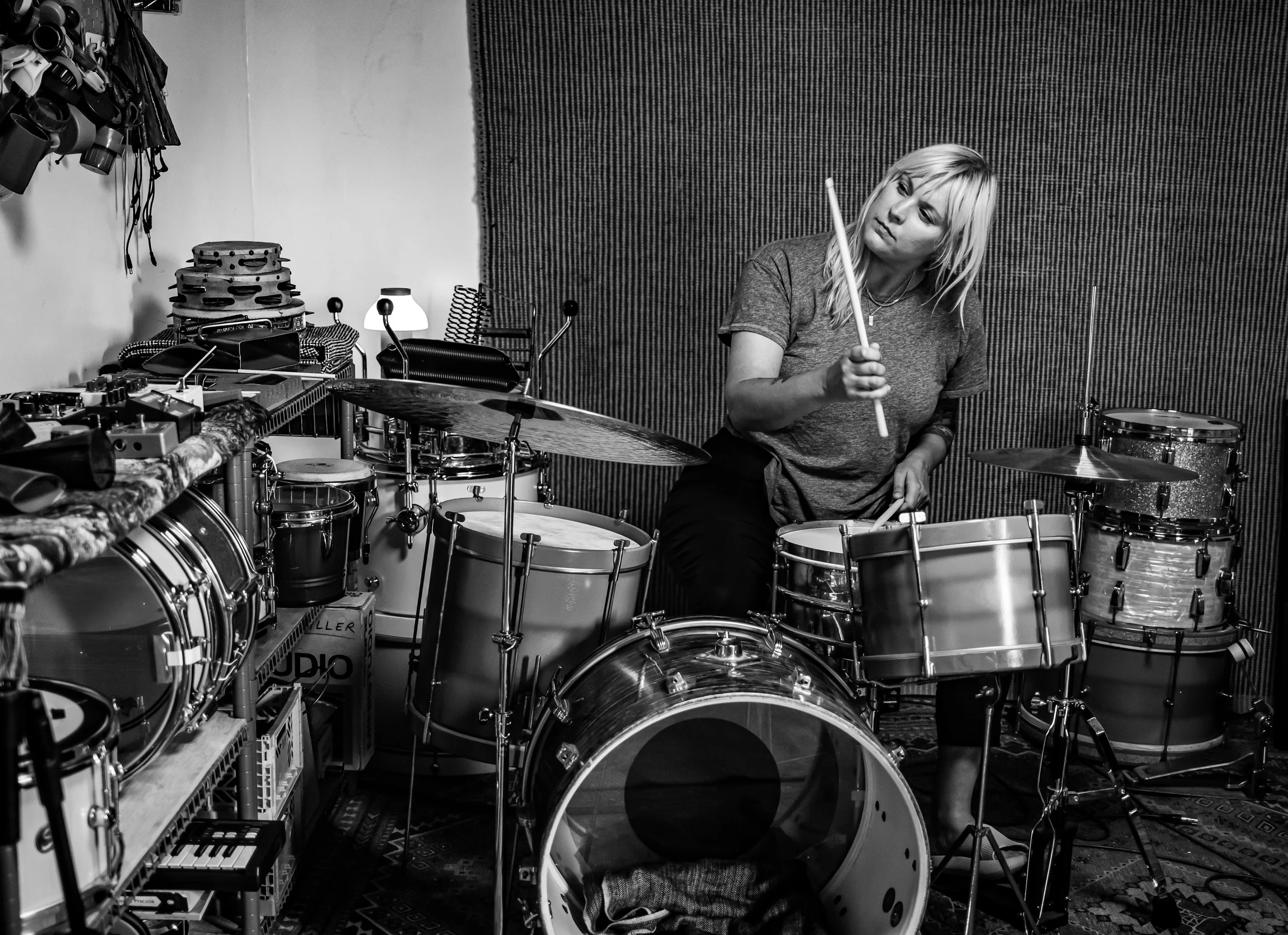ANABELLA LENZU on movement & motherhood
Originally from Argentina, Anabella Lenzu is a dancer, choreographer, scholar, and educator with over 30 years of experience working in Argentina, Chile, Italy, and the USA. Lenzu directs her own company, Anabella Lenzu/DanceDrama, which since 2006 has presented 400 performances, created 15 choreographic works, and performed at 100 venues, presenting thought-provoking and historically conscious dance-theater in New York City. She has produced and directed several award-winning short dance films and screened her work in over 200 national and international festivals.
In 2023, Anabella received the National Award for Outstanding Leadership in the Independent Sector by NDEO (National Dance Education Organization) acknowledging her work as a dance educator who develops innovative pedagogy in the dance field, groundbreaking teachings that have a significant impact on dance, as well as an established record of exemplary leadership on the state and national level in USA.
Lenzu has written for various dance and arts magazines and published her first book in 2013, entitled Unveiling Motion and Emotion.
Catherine Tharin and Anabella Lenzu spoke in April about her new show, Listen to Your Mother, which is included in the La MaMa Moves! Dance Festival ‘24, New York City, May 16-19, 2024.
Anabella speaks about what it means to be a mother as an immigrant who acts as a vessel for the 30 choreographers, dance writers, and dancers she interviewed for her latest work.
Interview by Catherine Tharin
Anabella, please tell us how this project, Listen to Your Mother, came about.
I established my company, Anabella Lenzu/DanceDrama, in NYC from 2006 to 2016 with six dancers. At the same time, I gave birth to my two kids, a son and a daughter. It was very difficult to coordinate and support all these schedules and structures. As a mother all my love and care went to my kids and to my family. As a professor, and as a dance teacher and company director, all my care went out to my students, to my dance company, and to my dancers. All my energy and intention flowed outward. I was feeling very outside of my own dance. I started to feel that the dances that I created in my company did not belong to my own body. My career started as a ballet dancer, and later, I explored modern dance until I found my language in the Dance Theater world.
I needed to speak from my own body experiences: What were the dances that were coming from my own body? In 2017, I created a solo performance titled No More Beautiful Dances. I spoke about being bulimic and later anorexic, how I gave birth to my kids, and so much more. This show was very moving for many people because they felt that I inspired them with the strength to continue.
My second show was The Night That You Stop Acting (2020), which was a search for identity. I try to find my points of reference as an immigrant to the United States. I used popular music from Argentina from the 80s and I talk about the “Argentinean disappeared generation” in the 70s and 80s in Argentina under the military government. That was an introspective journey.
The last part of this trilogy is Listen to Your Mother (2024). I talk about the roles of both immigrant and native-born mothers in American society. I am an immigrant, but my children are American citizens.
In Listen to Your Mother, I don't want to just tell my story as a mother. I’m interested in other mothers, too, which is why I interviewed 30 mothers who are also choreographers, dance writers, and dancers, from 30 years old to 80 years old. They gave me their testimony about how they keep the balance between motherhood and dance making. They speak about how they are making it in a society that doesn't really care much about this art form. We give so much love and care to our communities from working in the PTA in our public schools to creating our dance tribe. Here, especially in New York City, it’s so tough. It was very rewarding for me to hear all these other voices that echo how I was feeling. I tried to create conversation and sisterhood about motherhood and dance.
How would you define mothering in the US compared with mothering in Argentina or another country?
First of all, we challenge the archetype models, meaning the role models of our cultures. I'm Argentinian but my family comes from Italy. I have a beautiful family in Argentina. That culture says that women should be at home. You devote your life to your family. When you have kids, you stop your professional life. I have a lot of pressure to fulfill the society expectations as a perfect mother devoted to the household. I moved to United States to pursue and advance my career. If I stop my career what is the point of living in United States? My life would be easier with my Argentinian family by my side.
I'm here in the US, an immigrant, and it's just me and my husband. I have my family-in-law, but they are not in New York City. They're wonderful but they are far and so they are not here for the daily activities. They cannot come from around the corner to help out. When one kid has fever and I have to teach three classes and I have a show, things get complicated. It was hard for me to raise a family and to cultivate a community. In Argentina you have your grandparents, your great grandparents, your cousins. We grew up having the loved ones so close. The family is big, so you always have extra help. Here, I have a lot on my shoulders like every immigrant. It’s true that you need a village to have a family!
Is there a difference between the actual mothering in this culture and your original culture?
I think more freedom is given to the kids here. Here people are more relaxed about parenthood. I'm not a liberal mother. I'm more the “helicopter mother.” I'm always around my kids. I’m from a small city Bahia Blanca, that is called “The Door to Patagonia.” Living in New York City was a big change. To let my kids take the subway by themselves was a very big learning curve. It’s not just the language when I moved here but also the rules of this society. I try to learn and take the best of each culture: The American and The Argentinean/Italian.
In what ways are your children a combination of your original culture and the culture of New York?
I work hard in my house to speak Spanish and Italian every day. How do we do that? We listen to Spanish and Italian music, read books in Spanish, and watch soap operas in Spanish. Cartoons are subtitled. My husband and I are both Spanish speaking. The kids are fluent in both Spanish and Italian. That's the best gift that I can give them because when they go to Argentina or Italy, they understand the culture and the jokes!
I feel fortunate, as many immigrants in this country are undocumented. I'm legal so I can travel to Argentina at least once a year and the kids are exposed to my culture, to my mom, to the food, to the way of being. My son, when he was about 10 years old, said, “Mom, the Argentinian kids are nicer than the Americans.” I say well that’s NYC. Here in NYC, my son asks kids in the park if he can join them playing soccer and they say no. The Argentinian kids always say yes.
My kids learn that there are other ways of being in the world. They can choose, they have choices. Despite all, living in NYC provides my kids with many more opportunities than Argentina. I moved to this country because here I have choices. In Argentina I didn’t have many choices, especially in terms of developing my career. I followed job opportunities. But, living in NYC is both a sacrifice and a gift for my family. I want to give my kids these choices as a gift. There are some gifts and some regrets. Motherhood is also about that.
What was the most surprising thing you learned in your survey of interviews?
After hours of interviews with these 30 amazing and inspiring women, I sent the transcriptions to the mothers for approval, but surprisingly, more than half of them decided to take parts out. The difficult conversations were about depression, abortion, abuse and equality in the dance field. They were scared and fearful to be so honest in print. A lot of issues might cause them to be denied job possibilities, so they wanted to take out this part. It is a confirmation that we are still female artists in a repressive field that makes many of us scared to share our stories. We cannot really talk about certain things because there will be consequences. It made me very sad to confirm this fact. We want equality and diversity where we work.
We are much better than previous years, but the discrimination of women and women with kids in the work environment still exists. Employers are going to take a woman who doesn’t have kids versus someone who has kids. It’s problematic. I hear a lot of this, but nothing is published in these interviews for privacy reasons. Yeah, it’s a bomb but not a surprise. It's just a confirmation that it’s still happening in 2024.
What were some of the threads in the interviews that you found in common besides discrimination?
A deep commitment and love for the art form, for dance, for these empathic feelings. These mothers are thoroughly generous in the way that we look at the world with compassion. Motherhood gives us that view. In a world that is on fire right now, we need tolerance and compassion. I cried listening to every interview. There was something very moving with each. Many followed up with e-mails thanking me for the interview because they never thought about talking to someone about these things. Some of them are already grandmothers and going back in their past. I think it's just love. That's the answer.
How does dance figure into motherhood? Does dance guide mothers to mother in a certain way?
The mothers all have amazing relationships with their kids. These mothers talk about how open they are to improvisation, to change the plans, to listen. The key is communication. All 30 have these beautiful stories about their kids, whether the kids become artists or not. They let the kids experiment in the arts. They have open conversations and respect for each other. There’s no better environment than for a kid to be in the environment of the arts. We share with our family the things that we love and that are important. We allow our kids to follow their own paths.
How did you use the interviews in Listen to Your Mother?
I applied to more than 60 grants, and not surprisingly, I only got one grant and one residency. My idea was to have some of these mothers who are still active on stage with me, but there is no money out there for a project about motherhood. They told me #motherhoodisnotsexy, #motherhoodisnotmarketable. I use these lines in the show. From my original idea with a lot of bodies and experiences, I ended up doing a solo show. This is what I can do.
La MaMa and Nicky Paraiso (the curator) said that they’ve been hearing about this project for two years. Graciously, they asked me if I wanted to be included on the La MaMa Moves Festival. Mia Yoo, the director of La MaMa, is also a mother and understood the scope of this work.
My body is a vessel for all these stories. In the sound landscape there are the interviews of the mothers. It’s like a Greek chorus. My daughter, Fiamma Lenzu-Carroll, who is 10 years old, says “La MaMa is for the mamas!”
There are a lot of components with technology. I did a lot of drawings about femininity icons and symbols. I asked my husband, who's a photographer and works in multimedia, to animate these drawings so we have three big projections on the floor, on the back wall, and on my body. It goes from the political to the ritual aspect of motherhood. I'm close to 50 years and I need to dance a one-hour show, no pauses. It's definitely like a marathon for me. I feel the load of being a mother and being a choreographer carried through my body.
Fiamma Lenzu-Carroll and Anabella Lenzu
Your daughter dances with you. Why was she brought into this project?
I need the link to the next generation. I have a son who is 16 years old and my daughter who is 10 years old, but I feel that this feminine lineage needs to be seen on the stage. That’s why I asked her if she wanted to be on the stage with me. She has performed before, and she loved the idea. We pass these ideas from one generation of women to another. It’s fun but it's also tough because while I'm the mother, I'm also passing aspects of the craft of being a dancer, and what it is to be a choreographer, that if she didn't perform with me, I probably would not speak about it in the same way. This is the transmission of my dance knowledge but also of being a female in the world.
Is there anything that came up that stumped you or that you couldn't believe?
I've been writing since 1998 when I had my own magazine in Argentina Nexos. The interview part is very important because I'm investigating our female role in society. This was a big task. I have two assistants who help me with correcting my English. I never studied English so even to write these articles and translate them was a labor of love. But it was my duty because some of these women are underrepresented in the field. OK, nobody is paying attention to motherhood but I'm going speak anyway, with money or with no money. La MaMa is giving me a chance to show the work and I'm really thankful for that. I was told that this topic is too old and not trendy at all. We overlook it so I do my duty as a citizen in this case. My show celebrates motherhood with compassion. There is so much more that I would like to cover so this is the beginning. This could become a book or an oral archive.
Is there anything that came up that was particularly poignant? Is there a story of one of the interviewees that particularly struck you?
There are many undocumented immigrant choreographers who I interviewed. One, whose son was born in United States, said that for her son it is a privilege to be a citizen. She is grateful he was born in United States. This gave me deep sadness because I know what she means. These stories will not be reported because these undocumented choreographers are scared that they will be deported if they talk about it. That's why I say that I cry even now. I'm tearing up. Doing dance, we are very privileged to be able to express ourselves, or as with this show, to be the voice of others.
I’m nearing my 50s and my kids are in the middle of the road. When I interview someone who is 80 years old versus someone who is 30 years old, we each have different challenges. When some still need to change diapers and others look at their granddaughter or grandson, this gives me hope. Everything changes. This reminds me in moments of stress that there is hope. Motherhood comes full circle.
Listen to Your Mother runs from May 16 through May 19 at NYC’s La MaMa.
Photos by Todd Carroll
CATHERINE THARIN choreographs, curates, teaches, and writes. She danced in the Erick Hawkins Dance Company in the 1980s and '90s, was the Dance and Performance Curator at 92NY, NYC, for 15 years, and was a senior adjunct professor at Iona College, New Rochelle, NY, for 20 years. She writes dance reviews for The Dance Enthusiast and The Boston Globe, articles about dance for Side of Culture, and reports on dance for WAMC/Northeast Public Radio. She curated a 2024 dance season at Stissing Center, Pine Plains, NY. She continues to teach the Hawkins philosophy, technique, and repertory as an artist-in-residence. Her latest dance is a collaboration with jazz composer Joel Forrester and filmmaker Lora Robertson. Says Fjord Magazine of her work presented in November 2023: "gentle and precise movement contained to a small range, a good deal of floor work...cast a net of whimsical translucent sheen over it all. The evening was consistently charming, well-crafted and paced."
